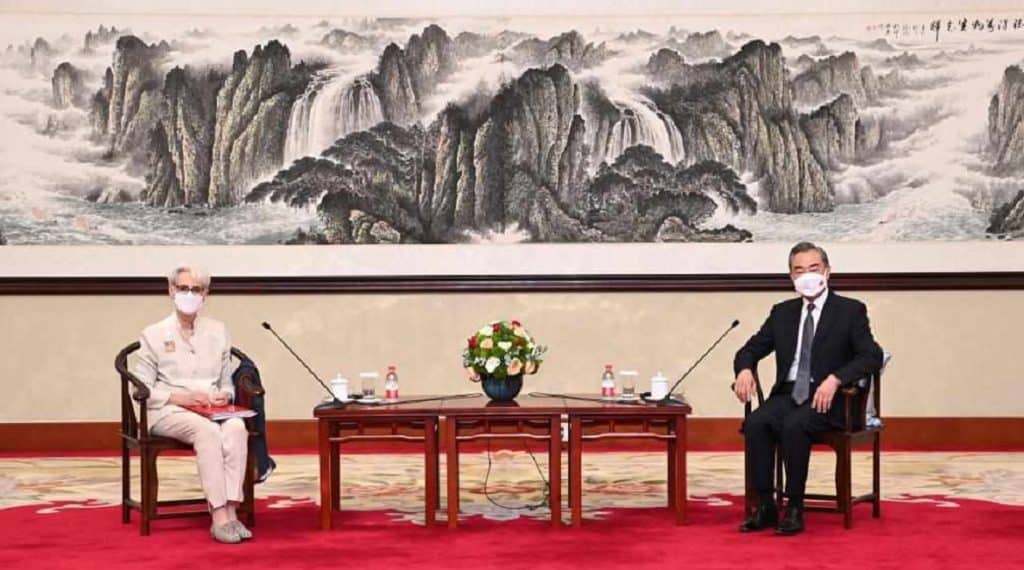By Prof. Engr. Zamir Ahmed Awan
Imposing sanctions is a typical cold war phenomenon. This issue remains the focus in the recent meeting between Chinese Vice Foreign Minister Xie Feng and Deputy U.S. Secretary of State Wendy Sherman in the city of Tianjin on July 25-26, 2021.

Xie described the relationship between the two powers as a “stalemate” that faces serious difficulties and condemned America’s rendering of China as an “imagined enemy” as the fundamental problem. He also presented two lists to the U.S., which includes asking the U.S. to remove sanctions on Chinese officials and expressing concerns over visa restrictions on Chinese students.
As a matter of fact, the rise of China was not digested by the U.S., which led anti-China sentiments. The U.S. was keeping very cordial relations as long as China was poor, backward, and underdeveloped in the 1980s, 1990, and 2000s. But when the Chinese Economy surpassed the German Economy and reached the status of the third-largest Economy in the world in 2006, the U.S. policymakers start thinking of China as a competitor. In 2010, when the Chinese crossed the Japanese Economy and emerged as the second-largest Economy, the feeling about China changed entirely, and the U.S. took measures to contain China, restrict the rise of China, and counter China. The U.S. think tanks belives that China may surpass American Economy much earlier than expected, so the policymakers speeded up the anti-China campaign.
The U.S. was enjoying absolute hegemony in the unipolar world after the disintegration of the former USSR in 1991. The U.S. policy was feeling insecure by the achievements and developments in China. That insecurity goes so far as to waging a militantly adversarial foreign policy to secure U.S. global dominance. America is a country that is looking for and always seeking an enemy of some kind and frequently elicits mass hysteria through its media channels, demonizing the “opponent” in order to justify and win support for its policies, proclaiming threats to the world that do not exist.
United States may be headed toward a disastrous conflict with China unless Washington updates its understanding of contemporary Chinese developments. After four decades of engagement, the United States and China now appear to be locked on a collision course that has already fomented a trade war, seems likely to produce a new cold war, and could even result in dangerous military conflict. The current deterioration of the bilateral relationship is the culmination of years of disputes, disillusionment, disappointment, and distrust between the two countries. Chinese leaders believe the United States still has futile designs on blocking China’s inevitable rise to great-power status.
The cold-war mentality is etched into America’s DNA and most recently demonstrated by the Biden administration’s seamless inheritance and wholehearted embrace of the confrontational approach of the previous Trump administration. It has continued the smear campaign against Chinese companies to meet protectionist ends, proliferated lies of genocide and forced labor, attempted to block China’s advances in technology, sought to try and build coalitions of allies to isolate China and undermine a business in Xinjiang and Hong Kong. As a matter of fact, President Joe was brought up in the cold war era; he entered into his political carrier during the cold war period, he was part of several administrations during the cold war and part of policymaking. The cold war has become an integral part of his character and approach; he may not be able to change himself at this old age.
Despite the U.S. placing an ever-growing number of sanctions on China, to receive reciprocal counter-sanctions is deemed an outrage and contrary to the rule of law. The United States complains about “China’s economic practices” while blacklisting hundreds of companies, putting pressure on foreign countries to do the same and yet dictating it has a divine right to more market access within China.
It hypocritically yields the rhetoric of human rights to smear China while turning a blind eye to atrocities in many allied countries, where violations of human rights have been carried out for decades. Itself, the U.S. has been involved in human rights violations severely; its war crimes in Iraq, Libya, Syria, Afghanistan yet have to be exposed. Thus, when it talks of “cooperation,” there is no good faith, and there is no credibility. It’s only about making more demands and about how the U.S. can advance its interests at China’s expense.
However, the relationship between the two countries must be that of equals and based on mutual respect for common interests and a shared future. China will never cave to American bullying and will never tolerate attempts to undermine its national sovereignty or its economic interests. China doesn’t endeavor to be an enemy of the United States but will not stand idly by if it is treated like one. China welcomes good faith and genuine partnership, not lectures, preaching, and subordinations. China has surpassed the stage where it can be coerced and pressurized. The U.S. may assess the changed geopolitics and modify its foreign policies accordingly.
Author: Prof. Engr. Zamir Ahmed Awan – Sinologist (ex-Diplomat), Editor, Analyst, Non-Resident Fellow of CCG (Center for China and Globalization), National University of Sciences and Technology (NUST), Islamabad, Pakistan.
(This is an opinion article. The views expressed belong only to the author and the publication of the article does not necessarily imply the endorsement of its content by World Geostrategic Insights).
Image source: news.cn







